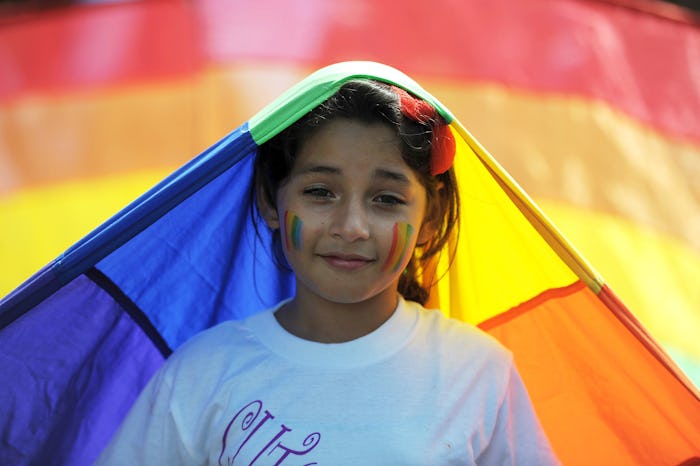Life

7 Ways To Support Your LGBTQ Child
Very few kids were "out" in my high school, in fact I would've had a hard time coming up with one name of an openly gay classmate. Yet, today, just off the top of my head, I can think of at least five former classmates who have since come out and are leading amazing lives. Why didn't these teens come out earlier? Maybe they were still questioning, but more likely they were worried that they simply wouldn't have parental support. Thankfully things are changing for the better in our society and you can easily be educated on ways to support your LGBTQ child.
In light of the horrific mass shooting of 49 patrons of a gay nightclub in Orlando on June 12, it's more important than ever for our children to know that they are loved and supported no matter how they identify. Our children must learn at a young age that targeting others for being LGBTQ is wholly unacceptable. We are all humans and it doesn't matter who we love, as long as we love.
If you think your child may identify as LGBTQ, or has recently come out to you, here are some ways that you can be a supportive parent.
1Let Them Be Themselves
A child's interests don't necessarily indicate their sexual orientation. In the year 2016, we should be disregarding stereotypes and accepting that activities such as singing, dancing, and sports are not gender-specific nor sexual orientation-specific. Just because adolescent James Corden or teenage Lin-Manuel Miranda wanted to be Broadway actors, didn't mean that their sexuality was defined by their interests. Pushing your son into sports or your daughter into ballet isn't going to prevent them from eventually loving who they are going to love.
2Listen To Your Child
In her book, Being Jazz: My Life as a (Transgender) Teen, Jazz Jennings explained that she was born a boy, but was adamant from the time that she could speak that she was a girl. As she explained it, she was born in a boy's body, but had a girl's brain. A child's feelings are valid, even if you feel like it may be a phase. It takes bravery to come to your parents and it is important to acknowledge and accept your child.
3Stop Using Hate Speech
Everyone just needs stop saying "that's so gay" already. A Huffington Post blogger who goes by Amelia, and is a mom to a gay child wrote that you should "eliminate hate speech from your vocabulary" because it is "demeaning, and as a parent, you shouldn’t be OK with demeaning your own child."
4Keep Negative Feelings To Yourself
It's OK to tell your child that you aren't quite sure how to feel, but avoid being negative. Don't deny their feelings or tell them that they are wrong, and absolutely don't get angry with your child. If you are upset and need to cry or be emotional, do it away from your child.
5Ask Questions
When you child comes out to you, it's normal not to know what to say at first. Planned Parenthood suggested asking your LGBTQ child questions such as, “How long have you known?” “How did you know?” “Why do you want me to know now?” “Are you in a relationship?” “How are you feeling about it all?” These will start a conversation and help you get to know your child better. You might also use this time to ask your child how they want to handle telling others. They may want your help coming to other family members or they may not yet be ready to share.
6Educate Yourself
Visit websites such as PFLAG (Parents, Families and Friends of Lesbian, Gay, Bisexual and Transgender People) or The Center (NYC's Lesbian, Gay, Bisexual & Transgender Community Center) to learn more about how to support your LGBTQ child.
7Keep Loving Them
Your child will always be your child. Their sexual orientation or gender identity doesn't make them any less human or a lesser part of your family. Your child will have to face some difficult times and they will need your love and support. Knowing that their parents love and support them can make all the difference in their future.